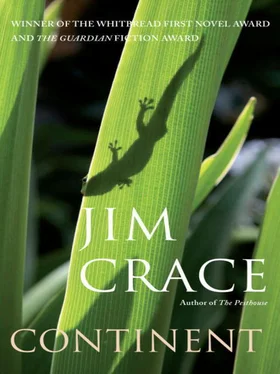They did not see him on a horse again, though all the young men of the mountains rode horses, for on the fourth day, at dusk, Eddy Rivette took his shorts and running shoes from their bag and set off at a soft pace across the compound of the school. He tested the ground and the stones and the thorns until he was sure of them, and then, lengthening his step, turned to the steep ridge which separated his half-valley from that of the village and the store. Alone on the tracks worn by animals and borrowed by men, he encountered everything which he had expected: sunset, warm earth, a sense of liberation amongst a landscape and a people equally dispossessed. He picked his way, running all the time but choosing, heading for landmarks and favouring distance to the hard work of gradients. By the time he was in sight of the store and was surprising those who sat outside, Eddy Rivette had followed for the first time the track which he was to run every day for the fifteen months he stayed in the hills.
‘What’s that teacher doing, running half-dressed across the hard ground of the hills?’
Old Loti could not give the answer. Men walked or rode in the village but perhaps in Canada they ran in white shorts. He did not know.
‘Perhaps in Canada they don’t have horses,’ he said, and the men nodded that this was so because they remembered how the teacher had sat on his horse two days before.
‘Children run,’ said the storekeeper. ‘They run just for the pleasure of it.’
‘Yes, but not alone,’ said Loti. ‘And anyway, watch him. He doesn’t run like a child. He runs as if he has some purpose … but without any urgency. That’s Canada for you.’
But they got used to it and after a while began to look forward to it, like anything reliable and harmless. Within an hour of the children from the school slowly picking their way down the hillside towards the village at the end of their day, the slim, tense figure of their teacher would appear briefly at the summit of the ridge above the village, disappear into the slip of an erosion gulley and then come in view again lower down the hill where the track was quite flat. There, the teacher came forward on his toes, head down and fists clenched, and ran the last two hundred metres in a sprint, not slowing and stopping until he had passed the smiles and grins of the men who sat at the store. Then he turned, cool and with breath to spare, and smiled himself and said hello to all who had been watching.
He got to be quite famous. But fame is something different from popularity. It is less demanding for a start and has more to do with talent than virtue. But not even much to do with talent. The fame which Eddy Rivette enjoyed was just that of someone behaving strangely but purposefully in a place where there were enough old men with the leisure to watch. When they smiled and clapped at his daily approach at the store it was not with affection or welcome but at what he was providing for their day If they had genuinely known and liked him, the running would have embarrassed them. It was strange. It was quirky. It separated them from him. Not to be wished of a friend.
’Isra-kone, however, was a friend of the village. He was a young man, uneducated in school ways but knowing and intelligent and, best of all, a fine talker and a great horseman. These two things mattered to the men of the village who were too old to be judged by the recent talents which were taught at the school. ’Isra was one of the last initiates of the valley, having spent twelve days, two of them drugged unconscious, at the circumcision lodge in the mountains. He knew the secret songs in the old Siddilic, drummed endlessly at him and his fellows at the lodge. They had repeated the words, their stomachs pressed to the walls to ease the pains of hunger. After ’Isra’s lodge the old mayor had died and the new mayor, old Loti’s brother, discontinued circumcision of the young villagers and the lodges and the secret alliances which sprang from them, not because he was modern but because he feared the new directives of the government officers in the city more than he feared the criticism of the old gossips in the village.
And so ’Isra and the young poor men of his age were the last ‘brotherhood’ and the old gossips whom the mayor didn’t fear put their hopes on them. It was foolish, for the younger, uncircumcised brothers and sons of the ‘brotherhood’ were better for the village. They read and wrote and spoke English with the runner at the school as if it were their own language. But still the old men preferred ’Isra and his friends. And secretly they mistrusted the ponderous troupe of pupils who left with their pens and books for the school at eight each day.
Of the brotherhood ’Isra was their favourite, more popular than their own mayor’s son who had gone away to colleges in England and Italy and got new wild ideas. They didn’t need much excuse to like ’Isra. He was so easy. But when they retold how he had ridden his white mare that night of the rains across the hills to bring help for the mayor’s chest, where his heart was beating and flapping like a trapped bird, they found all the excuse to like him thoroughly. The helicopter had come from the town on to the flat edge of the village and taken the mayor away to hospital. Four foreign doctors had slaved to quiet his heart and keep the mayorship with this old fearful man and away from the wild ideas of his wild college son. And ’Isra had returned to tell of his ride and that the chief would be well. Even the smallest children will say it. ’Isra-kone is the finest horseman in the valley.
’Isra was a quiet man, though a great talker when he chose, who had few certainties. He did not trust the weather or his cattle or the life of his horse whom he loved. When the weather was fine and his stock was healthy and he woke in the morning to find the horse bright-eyed and vigorous, then he let himself enjoy that day. But he did not expect it to hold for the next day. He expected only what he could see approaching with his own eye, and (since the night darkness blocked his vision) his anticipations ended each day at sunset.
He had known, since the first swollen stomach of his boyhood, what it was to sit watchful at night beneath the stars. That was the extent of his mysticism. For the rest, he was happy while he had maize and fulfilled while he was popular in the village. In the two years since his ride across the mountains to bring the helicopter, he had allowed a small certainty into his life, that his comings and goings were commented on. That as he rode down from the lands the old men at the store nodded and smiled with affection and said, ‘There’s young ’Isra with his horse. What’s he up to?’ and called, ‘Go well, ’Isra. Where are you riding?’ Or, ‘From where are you come?’
When the old men stopped calling and nodding and commenting they did not like him any less. It was just that their interests were elsewhere, fixed a little to the right of the wide erosion gulley on the ridge above the village where the teacher appeared each evening for an instant before disappearing and appearing again, jogging doggedly towards them and their gossip at the store.
’Isra watched his rival with the old men for a season until his own fame had eroded away and not even the men of his brotherhood turned to admire him and his white mare or whisper his name. Their eyes were not for one of their own whom they loved and trusted and understood but for the foreigner for whom they cared nothing, but who came faster and faster each day from the ridge below the sunset and who seemed to tell them something about man and their mountains which they had never guessed — that men were like hares who could bounce across the black-studded basalt earth around which they had stumbled for centuries until the horse had come.
Читать дальше












